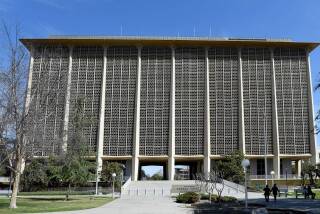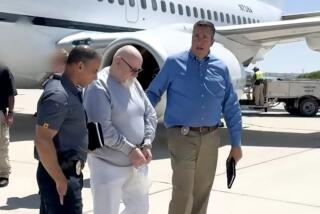Juan Corona, California serial killer convicted of killing 25 farmworkers, is again denied parole
A California review board has once again denied parole to Juan Corona, who was convicted of killing 25 itinerant farm laborers in what was once the worst serial murder case in U.S. history.
The state Board of Parole Hearings on Wednesday denied Corona’s request for parole — his eighth appearance before the board.
Now 82, Corona is not eligible for a hearing for five years and will continue to serve his life sentence at Corcoran State Prison, according to Luis Patino, a spokesman for the state Department of Corrections and Rehabilitation.
Corona has been behind bars since 1971, when a farmer in Sutter County came along a freshly dug hole in a peach orchard. The farmer, who had contracted with Corona to hire field workers, returned the next day and saw the hole filled with dirt. To allay his suspicions, he called police.
In the shallow grave, officers found a man’s body with his head hacked and his body riddled with stab wounds. Corona was arrested a week later. Over the next two weeks, police recovered the bodies of more slain farmworkers from shallow graves along the Feather River near Marysville, north of Sacramento.
The vast majority of the 25 victims were hacked and stabbed to death. One was shot.
The evidence against Corona was largely circumstantial and much of the motive around the killings has remained a mystery. From Corona’s home and vehicles, investigators confiscated a green ledger book with the names of eight of the victims, along with an 18-inch machete, a post-hole digger, a wooden club and a gun.
Prosecutors also claimed they had a receipt from a local butcher with Corona’s name and handwriting that was found in one of the graves.
After a lengthy trial in 1973, Corona was sentenced to 25 consecutive life terms — a penalty so harsh that it elicited gasps in the courtroom when the judge handed it down.
But a state appellate court overturned the first conviction in 1978, blasting Corona’s defense attorney for mounting a farcical defense and calling no rebuttal witnesses to counter the prosecution’s 119 witnesses.
A second trial began in 1982 and was notable for Corona’s defense offering an alternative theory behind the slayings. His attorney told jurors that it was Corona’s late brother who carried out the killings, driven by a “maniacal rage” that originated in “the frustration of a morbid sexuality.” The lawyer argued that Corona was more mild-mannered than his brother, and innocent.
After closing arguments took 12 days to complete, the jury of seven men and five women convicted Corona of all charges.
While in custody, he lost an eye from an inmate attack, his wife divorced him, he had at least two heart attacks and he suffers from dementia.
Corona intimated his guilt for the first time in a 2011 parole hearing, saying the men were “winos” and had trespassed in the orchards, the Associated Press reported.
But Sutter County Dist. Atty. Amanda Hopper told the AP that in Thursday’s hearing, Corona appeared to walk back his earlier comments.
“When it had anything to do with killing the 25 people or his mental state, he conveniently could no longer remember,” Hopper told the news service. “He specifically said that, ‘I don’t remember that I killed anyone, I don’t remember that I did anything.’”
Twitter: @MattHjourno
ALSO
Uber driver charged with raping unconscious 17-year-old in Orange County
Man suspected in Winnetka double-killing arrested at U.S.-Mexico border, authorities say
Search for missing California mother continues after husband passes polygraph exam, officials say
More to Read
Sign up for Essential California
The most important California stories and recommendations in your inbox every morning.
You may occasionally receive promotional content from the Los Angeles Times.










